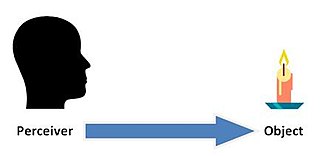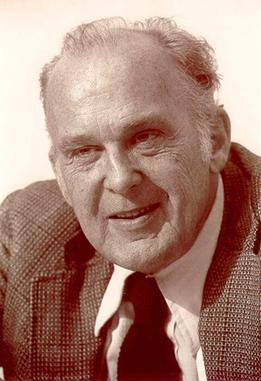Related Research Articles
Introspection is the examination of one's own conscious thoughts and feelings. In psychology, the process of introspection relies on the observation of one's mental state, while in a spiritual context it may refer to the examination of one's soul. Introspection is closely related to human self-reflection and self-discovery and is contrasted with external observation.
Eliminative materialism is a materialist position in the philosophy of mind. It is the idea that the majority of mental states in folk psychology do not exist. Some supporters of eliminativism argue that no coherent neural basis will be found for many everyday psychological concepts such as belief or desire, since they are poorly defined. The argument is that psychological concepts of behavior and experience should be judged by how well they reduce to the biological level. Other versions entail the nonexistence of conscious mental states such as pain and visual perceptions.

In philosophy of perception and epistemology, naïve realism is the idea that the senses provide us with direct awareness of objects as they really are. When referred to as direct realism, naïve realism is often contrasted with indirect realism.
Perspectivism is the epistemological principle that perception of and knowledge of something are always bound to the interpretive perspectives of those observing it. While perspectivism does not regard all perspectives and interpretations as being of equal truth or value, it holds that no one has access to an absolute view of the world cut off from perspective. Instead, all such viewing occurs from some point of view which in turn affects how things are perceived. Rather than attempt to determine truth by correspondence to things outside any perspective, perspectivism thus generally seeks to determine truth by comparing and evaluating perspectives among themselves. Perspectivism may be regarded as an early form of epistemological pluralism, though in some accounts includes treatment of value theory, moral psychology, and realist metaphysics.
Naturalized epistemology is a collection of philosophic views concerned with the theory of knowledge that emphasize the role of natural scientific methods. This shared emphasis on scientific methods of studying knowledge shifts focus to the empirical processes of knowledge acquisition and away from many traditional philosophical questions. There are noteworthy distinctions within naturalized epistemology. Replacement naturalism maintains that traditional epistemology should be abandoned and replaced with the methodologies of the natural sciences. The general thesis of cooperative naturalism is that traditional epistemology can benefit in its inquiry by using the knowledge we have gained from the cognitive sciences. Substantive naturalism focuses on an asserted equality of facts of knowledge and natural facts.
Gilbert Harman was an American philosopher, who taught at Princeton University from 1963 until his retirement in 2017. He published widely in philosophy of language, cognitive science, philosophy of mind, ethics, moral psychology, epistemology, statistical learning theory, and metaphysics. He and George Miller co-directed the Princeton University Cognitive Science Laboratory. Harman taught or co-taught courses in Electrical Engineering, Computer Science, Psychology, Philosophy, and Linguistics.
Experimental philosophy is an emerging field of philosophical inquiry that makes use of empirical data—often gathered through surveys which probe the intuitions of ordinary people—in order to inform research on philosophical questions. This use of empirical data is widely seen as opposed to a philosophical methodology that relies mainly on a priori justification, sometimes called "armchair" philosophy, by experimental philosophers. Experimental philosophy initially began by focusing on philosophical questions related to intentional action, the putative conflict between free will and determinism, and causal vs. descriptive theories of linguistic reference. However, experimental philosophy has continued to expand to new areas of research.

Gregory Paul Currie FAHA is a British philosopher and academic, known for his work on philosophical aesthetics and the philosophy of mind. Currie is Professor of Philosophy at the University of York and Executive Editor of Mind & Language.

Donald Thomas Campbell was an American social scientist. He is noted for his work in methodology. He coined the term evolutionary epistemology and developed a selectionist theory of human creativity. A Review of General Psychology survey, published in 2002, ranked Campbell as the 33rd most cited psychologist of the 20th century.
Metaepistemology is the branch of epistemology and metaphilosophy that studies the underlying assumptions made in debates in epistemology, including those concerning the existence and authority of epistemic facts and reasons, the nature and aim of epistemology, and the methodology of epistemology.
Hilary Kornblith is an American philosopher. He is a professor of philosophy at the University of Massachusetts Amherst and one of contemporary epistemology's most prominent proponents of naturalized epistemology.
Metaphysical naturalism is a philosophical worldview which holds that there is nothing but natural elements, principles, and relations of the kind studied by the natural sciences. Methodological naturalism is a philosophical basis for science, for which metaphysical naturalism provides only one possible ontological foundation. Broadly, the corresponding theological perspective is religious naturalism or spiritual naturalism. More specifically, metaphysical naturalism rejects the supernatural concepts and explanations that are part of many religions.
Nancey Murphy is an American philosopher and theologian who is Professor of Christian Philosophy at Fuller Theological Seminary, Pasadena, CA. She received the B.A. from Creighton University in 1973, the Ph.D. from University of California, Berkeley in 1980, and the Th.D. from the Graduate Theological Union (theology) in 1987.

Horace Romano "Rom" Harré was a New Zealand-British philosopher and psychologist.

Richard Newell Boyd was an American philosopher, who spent most of his career teaching philosophy at Cornell University where he was Susan Linn Sage Professor of Philosophy and Humane Letters Emeritus. He specialized in epistemology, the philosophy of science, language, and mind.
Epistemology or theory of knowledge is the branch of philosophy concerned with the nature and scope (limitations) of knowledge. It addresses the questions "What is knowledge?", "How is knowledge acquired?", "What do people know?", "How do we know what we know?", and "Why do we know what we know?". Much of the debate in this field has focused on analyzing the nature of knowledge and how it relates to similar notions such as truth, belief, and justification. It also deals with the means of production of knowledge, as well as skepticism about different knowledge claims.
Lawrence Shapiro is a professor in the Department of Philosophy at the University of Wisconsin–Madison in the United States. His research focuses in the philosophy of psychology. He also works in both the philosophy of mind, and philosophy of biology.
Formative epistemology is a collection of philosophic views concerned with the theory of knowledge that emphasize the role of natural scientific methods. According to formative epistemology, knowledge is gained through the imputation of thoughts from one human being to another in the societal setting. Humans are born without intrinsic knowledge and through their evolutionary and developmental processes gain knowledge from other human beings. Thus, according to formative epistemology, all knowledge is completely subjective and truth does not exist.
Patricia W. Kitcher is the Roberta and William Campbell Professor of Philosophy at Columbia University, widely known for her work on Immanuel Kant and on philosophy of psychology. She has held many positions at different universities, is a founding chair of a committee at the University of California, and has a lead role in multiple professional organizations. Kitcher's most notable interests throughout her career regard cognition and Kantian ethics. She is the author of multiple papers and two books.
References
- ↑ humansciences.iit.edu
- ↑ Since 1992 he has worked as a professor of philosophy at Loyola University Chicago, where he holds appointments in the philosophy department and the Parmly Sensory Sciences Institute.